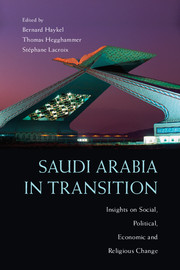2 - Oil and Political Mobilization in Saudi Arabia
Published online by Cambridge University Press: 05 January 2015
Summary
Although Saudi Arabia is not a hotbed of political activism, it is still possible to discern periods when Saudis are more engaged in political activity than in other periods. Those periods of greater political mobilization do not coincide with downturns in oil prices. This is counterintuitive, as oil wealth is the motor of the Saudi economy. Given the enormous role of oil in the economy and the government’s implicit claim to citizens’ loyalty based upon its ability to provide them a comfortable lifestyle, it would seem logical that Saudis would be most likely to mobilize against the government when oil prices fall. Moreover, periods of lower oil prices should weaken the Saudi regime, which relies almost exclusively upon oil revenues to fund its government. Thus both incentives to mobilize should be higher and the ability of the government to control the population reduced during periods of low oil prices. However, political mobilization has occurred in Saudi Arabia during times of relatively high oil revenues. This chapter will suggest a number of reasons for this anomalous result, including a fiscal system that has allowed the Saudi government to tap private sector funds during periods of budget stringency and an ability by its own actions to affect the price of oil and thus the size of its treasury. Because of these factors, Saudi Arabia has been able to avoid the regime crisis that falling oil prices have frequently caused in other oil states. It will also explore the dynamics of political mobilization in Saudi Arabia, suggesting that regional crises more than domestic economic swings motivate Saudis to act politically.
- Type
- Chapter
- Information
- Saudi Arabia in TransitionInsights on Social, Political, Economic and Religious Change, pp. 13 - 30Publisher: Cambridge University PressPrint publication year: 2015
References
- 4
- Cited by



